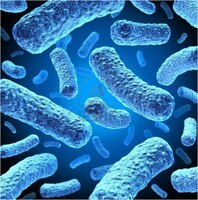| Graham Christie, Milena Lazarevska and Christopher R. Lowe. (2008) Functional consequences of amino acid substitutions to GerVB, a component of the Bacillus megaterium spore germinant receptor. Journal of Bacteriology 190, 2014-2022.
Jennifer L. Farmer, et al. (2008) Galectin 15 (LGALS15) functions in trophectoderm migration and attachment. Federation of American Societies for Experimental Biology Journal 22, 548-560.
Brantley R. Herrin, et al. (2008) Structure and specificity of lamprey monoclonal antibodies. Procedings of the National Academy of Science 105, 2040-2045.
Samuel A. Shelburne, III, et al. (2008) A direct link between carbohydrate utilization and virulence in the major human pathogen group A Streptococcus. Procedings of the National Academy of Science 105, 1698-1703.
Phillip J. Monaghan, David Leys and Nigel S. Scrutton. (2007) Mechanistic aspects and redox properties of hyperthermophilic L-proline dehydrogenase from Pyrococcus furiosus related to dimethylglycine dehydrogenase/oxidase. Federation of American Societies for Experimental Biology Journal 274, 2070-2087.
Xiuhua Pang and Susan T. Howard. (2007) Regulation of the α-crystallin gene acr2 by the mprAB two-component system of Mycobacterium tuberculosis. Journal of Bacteriology 189, 6213-6221.
Pernilla Larsson Birgander, et al. (2005) Nucleotide-dependent formation of catalytically competent dimers from engineered monomeric ribonucleotide reductase protein R1. Journal of Biological Chemistry 280, 14997-15003.
Catherine Paradis-Bleau, Francois Sanschagrin and Roger C. Levesque. (2005) Peptide inhibitors of the essential cell division protein FtsA. Protein Engineering Design and Selection 18, 85-91.
Francois Sanschagrin and Roger C. Levesque. (2005) A specific peptide inhibitor of the class B metallo-{beta}-lactamase L-1 from Stenotrophomonas maltophilia identified using phage display. Journal of Antimicrobial Chemotherapy 55, 252-255.
Laura I. Katona, et al. (2004) The Fur homologue in Borrelia burgdorferi. Journal of Bacteriology 186, 6443-6456.
Sharmila Sivendran, et al. (2004) Two novel mutant human adenylosuccinate lyases (ASLs) associated with autism and characterization of the equivalent mutant Bacillus subtilis ASL. Journal of Biological Chemistry 279, 53789-53797.
Deanne M. Compaan and W. Ross Ellington. (2003) Functional consequences of a gene duplication and fusion event in an arginine kinase. 206, 1545-1556.
Yusuf Kaya and James Ofengand. (2003) A novel unanticipated type of pseudouridine synthase with homologs in bacteria, archaea, and eukarya. RNA 9, 711-721.
Michael B. Murphy, et al. (2003) An improved method for the in vitro evolution of aptamers and applications in protein detection and purification. Nucleic Acids Research 31, e110-.
Ahmed El Zoeiby, et al. (2003) Identification of novel inhibitors of Pseudomonas aeruginosa MurC enzyme derived from phage-displayed peptide libraries. Journal of Antimicrobial Chemotherapy 51, 531-543.
Paul L. DeAngelis and Amy J. Padgett-McCue. (2000) Identification and molecular cloning of a chondroitin synthase from Pasteurella multocida type F. Journal of Biological Chemistry 275, 24124-24129.
In-Hong Choi, et al. (1997) Clonal expansion of CD8+ T cells in Kawasaki disease. Journal of Immunology 159, 481-486.
Thomas P. Shanley, et al. (1997) Requirement for C-X-C chemokines (macrophage inflammatory protein-2 and cytokine-induced neutrophil chemoattractant) in IgG immune complex-induced lung injury. Journal of Immunology 158, 3439-3448.
Y. Xu, et al. (1995) High-yield bacterial expressio, purification, and functional reconstitution of the tricarboxylate transport protein from rat liver mitochondria. Biochemical and Biophysical Research Communications 207, 783-789.
|
|







